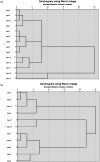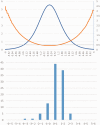Examining the validity and reliability of the revised developmental work personality scale (RDWPS)-traditional Chinese version
- PMID: 34987347
- PMCID: PMC8721580
- DOI: 10.1177/15691861211021926
Examining the validity and reliability of the revised developmental work personality scale (RDWPS)-traditional Chinese version
Abstract
Background: Work personality was found to relate to successful work adjustment, job readiness, work motivation and job maintenance. The revised developmental work personality scale (RDWPS) is a self-reported assessment to evaluate the work personality of the examinee which further psychometric study is required and needs to be applied to different culture. The aim of this study was to examine the theoretical structure, validity, and reliability of the traditional Chinese version of the RDWPS.
Methods: The subjects were 113 university students with no known physical or mental illness who aged between 19 and 22. Cluster analysis was used to examine the theoretical structure. Rasch analysis was applied to examine the psychometric properties.
Results: We dropped the unfit three items and found the 11 items of traditional Chinese version of the RDWPS was adequate to fit the theoretical construct. The results of the Rasch analysis showed that the 11 items with a three-point rating scale of the traditional Chinese version of the RDWPS had acceptable internal consistency (α = 0.76), moderate reliability, and met the criteria of unidimensionality.
Conclusions: The results of this study provided initial evidence that the traditional Chinese version of the RDWPS can be readily applied to research related to work behavior for those whose primary language is traditional Chinese, with adequate reliability and validity.
Keywords: Rasch; Work; cluster analysis.
© The Author(s) 2021.
Conflict of interest statement
Declaration of conflicting interests: The author(s) declared no potential conflicts of interest with respect to the research, authorship, and/or publication of this article.
Figures
References
-
- Amin L., Rosenbaum P., Barr R., Sung L., Klaassen R. J., Dix D. B., Klassen A. (2012). Rasch analysis of the PedsQL: An increased understanding of the properties of a rating scale. Journal of Clinical Epidemiology, 65, 1117–1123. - PubMed
-
- Arnadottir G., Fisher A. (2008). Rasch analysis of the ADL scale of the A-ONE. American Journal of Occupational Therapy, 62, 51–60. - PubMed
-
- Bolton B. (1992). Work personality profile, Self-Report Version [and] Manual for the Work Personality Profile, Self-Report Version. Retrieved May 28, 2021. https://eric.ed.gov/?id=ED347742.
-
- Chen Y. L., Pan A. W., Chung L., Chen T. J. (2015). Examining the validity and reliability of the Taita symptom checklist using Rasch analysis. Journal of the Formosan Medical Association = Taiwan yi Zhi, 114, 221–230. - PubMed
-
- Chien C. W., Bond T. G. (2009). Measurement properties of fine motor scale of peabody developmental motor scales: A Rasch analysis. American Journal of Physical Medicine & Rehabilitation, 88, 376–386. - PubMed
LinkOut - more resources
Full Text Sources
Miscellaneous



